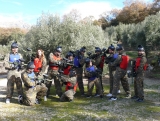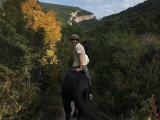Scuba diving provides us with beautiful and surprising moments while giving us an adrenaline rush. It's one of the best year-round activities you can do, because even if you just try a discovery dive, you won't be able to resist going underwater again whenever you get the chance.
But what about the inhabitants of the seabed? As long as we dive correctly and respectfully towards the environment, there shouldn't be any problems. However, many people don't consider this, and when they go diving they think they can "make themselves at home" during the dive.

What is feeding?
Diving is one of the most fascinating water sports, as it allows you to discover a world we're not accustomed to. But what we must be clear about is that when diving, we often forget we're in the "home" of countless animals and plants that live on the seabed.
If you like animals - in this case fish - you might be tempted to try to attract their attention so they come closer and you can touch them. How can you make them approach you? The easiest way is to feed them. But is this practice correct? Absolutely not.
You should never leave food underwater with the intention of attracting marine life towards divers. This is harmful to the natural environment, even if it doesn't appear so at first glance.

Many divers use this tactic to observe fish from closer range, but they forget that providing them with food is harmful, as gaining confidence and approaching humans will condemn them sooner or later. Moreover, if they become accustomed to being fed by outsiders (with boiled eggs, sausages, etc.), they might stop trying to find food themselves and could even suffer indigestion.
Their behaviour might also change to the extent that, for example, animals that normally live hidden behind rocks or only come out at night might decide to emerge into open water, putting themselves at risk.

Feeding today
Fortunately, this practice isn't as common today as it was years ago, but it still hasn't been completely eradicated. The relevant authorities should regulate this activity and impose appropriate penalties on those who engage in it.
But it's also our responsibility to dive and explore the seabed while respecting the environment we encounter - its flora and fauna. Therefore, if you come across this practice, reject it, as we must understand that we cannot harm nature just for our own amusement or enjoyment.












